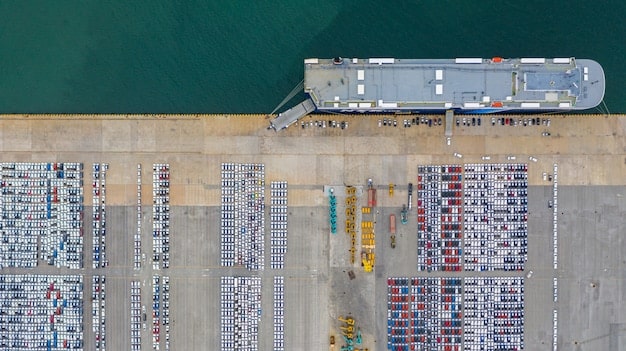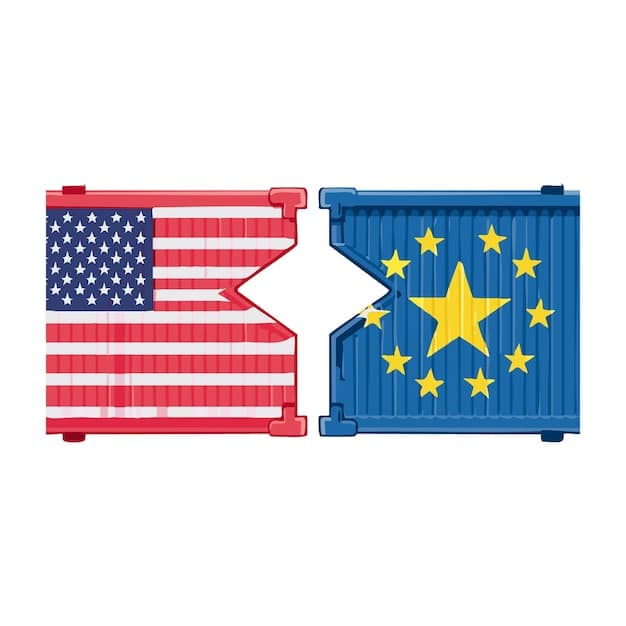US Trade Disputes: Responses & Economic Consequences

How will the US respond to the latest international trade dispute and what are the potential economic consequences? The US response can range from tariffs and sanctions to diplomatic negotiation, each carrying significant economic impacts that affect both domestic and international markets. Understanding these responses is crucial for businesses and consumers alike.
International trade disputes are a recurring feature of global economics, and the United States is frequently at the center of these conflicts. How will the US respond to the latest international trade dispute and what are the potential economic consequences? Understanding the strategic options available to the US government and the potential economic repercussions is crucial for businesses, policymakers, and citizens alike.
Understanding International Trade Disputes
International trade disputes arise when countries disagree over trade policies and practices. These disagreements can stem from tariffs, quotas, subsidies, intellectual property rights, or other regulatory barriers. These disputes often escalate into trade wars, where countries impose retaliatory measures against each other.
Common Causes of Trade Disputes
Several factors contribute to international trade disputes. These include protectionist measures designed to shield domestic industries, disagreements over fair market access, and concerns about national security. Understanding these underlying causes is essential for predicting and managing potential conflicts.
- Tariffs and Import Duties
- Subsidies and Countervailing Duties
- Intellectual Property Rights
Historical Examples of US Trade Disputes
The US has a long history of involvement in international trade disputes. Past conflicts with countries like China, Japan, and the European Union have shaped current trade policies and practices. Analyzing these historical examples provides valuable insights into the strategies and potential outcomes of future disputes.

US Response Strategies to Trade Disputes
When faced with an international trade dispute, the US government has several response strategies at its disposal. These range from diplomatic negotiations and legal challenges to the imposition of tariffs and other trade barriers. The chosen strategy often depends on the nature of the dispute, the countries involved, and the broader geopolitical context.
Diplomatic Negotiations and Agreements
Diplomacy is often the first line of defense in resolving trade disputes. The US may engage in bilateral or multilateral negotiations to reach agreements that address the underlying issues. Successful negotiations can lead to mutually beneficial outcomes and prevent escalation into more damaging trade wars.
Tariffs and Trade Barriers
Tariffs are a common tool used by the US to protect domestic industries and retaliate against unfair trade practices. The imposition of tariffs can increase the cost of imported goods, making domestic products more competitive. However, tariffs can also lead to higher prices for consumers and retaliatory measures from other countries.
- Impact on Consumers
- Effects on Domestic Industries
- Retaliatory Tariffs
Legal Challenges through the WTO
The World Trade Organization (WTO) provides a framework for resolving trade disputes among its member countries. The US can file legal challenges against countries that violate WTO rules. This process can be lengthy and complex, but it offers a mechanism for enforcing international trade agreements.
Potential Economic Consequences for the US
The economic consequences of international trade disputes can be significant for the US. These effects can range from changes in consumer prices and business investments to broader impacts on economic growth and employment. Understanding these potential consequences is crucial for evaluating the effectiveness of different response strategies.

Impact on US Businesses and Industries
Trade disputes can have a direct impact on US businesses and industries. Companies that rely on imported goods or export their products to foreign markets may face higher costs and reduced demand. Some industries may benefit from protectionist measures, while others may suffer from retaliatory tariffs.
Changes in Consumer Prices and Spending
The imposition of tariffs can lead to higher prices for consumers, as businesses pass on the increased costs of imported goods. This can reduce consumer spending and affect overall economic demand. The extent of the impact depends on the products affected and the availability of domestic alternatives.
- Inflationary Pressures
- Reduced Purchasing Power
- Shift in Consumption Patterns
Effects on US Employment and Economic Growth
Trade disputes can affect US employment and economic growth through various channels. Reduced exports can lead to job losses in export-oriented industries, while increased import costs can reduce business investment and productivity. The overall impact on economic growth depends on the scale and duration of the dispute.
The Role of Government Policy and Regulation
Government policy and regulation play a crucial role in shaping the US response to international trade disputes. Trade policies, tariffs, quotas, and regulatory standards all influence the dynamics of these conflicts and their economic consequences. Effective policy decisions can mitigate the negative impacts and promote long-term economic growth.
Trade Policy and Negotiation Strategies
US trade policy sets the framework for how the government engages in international trade negotiations. These policies may prioritize free trade, protectionism, or a combination of both. The choice of negotiation strategy can significantly affect the outcome of trade disputes.
Tariff and Quota Regulations
Tariff and quota regulations are key tools for managing trade flows and protecting domestic industries. The US government sets these regulations based on economic and political considerations. Changes in tariff and quota policies can have immediate effects on import costs and trade volumes.
- Protection of Domestic Industries
- Management of Trade Flows
- Political Considerations
Regulatory Standards and Compliance
Regulatory standards and compliance requirements can also be a source of trade disputes. Countries may disagree over the fairness and necessity of these standards, leading to conflicts over market access. The US government works to ensure that its regulatory standards are consistent with international trade agreements.
Geopolitical Factors Influencing US Trade Responses
Geopolitical factors play a significant role in shaping the US response to international trade disputes. The US often considers its broader strategic interests and alliances when deciding how to address these conflicts. These geopolitical considerations can influence the choice of response strategies and the potential outcomes of trade disputes.
Strategic Alliances and Partnerships
The US relies on strategic alliances and partnerships to advance its trade interests. These alliances can provide support in trade negotiations and help to counter unfair trade practices. The strength and stability of these partnerships can influence the effectiveness of US trade responses.
National Security Concerns
National security concerns often play a role in US trade policy. The US may impose trade restrictions on countries that pose a security threat or engage in practices that undermine US national interests. These restrictions can be justified on the grounds of protecting critical industries and technologies.
- Protection of Critical Industries
- Restrictions on Security Threats
- Balancing Economic and Security Interests
Global Economic Stability
The US also considers the broader implications for global economic stability when responding to trade disputes. Escalating trade wars can disrupt global supply chains and undermine economic growth. The US may work with international organizations to promote stability and prevent trade conflicts from spiraling out of control.
Future Trends in US Trade Policy
Looking ahead, several trends are likely to shape US trade policy and its responses to international trade disputes. These include the rise of new economic powers, the increasing importance of digital trade, and the growing focus on environmental and labor standards. Adapting to these trends will be crucial for maintaining US competitiveness and promoting sustainable economic growth.
The Rise of New Economic Powers
The rise of new economic powers, such as China and India, is changing the landscape of international trade. These countries are becoming major players in global markets and are increasingly challenging the dominance of the US. The US will need to adapt its trade policies to address these new realities.
The Increasing Importance of Digital Trade
Digital trade is becoming an increasingly important component of the global economy. The US will need to develop policies that promote digital trade while addressing issues such as data privacy, cybersecurity, and intellectual property rights.
- Promoting Digital Trade
- Addressing Data Privacy Concerns
- Protecting Intellectual Property
Focus on Environmental and Labor Standards
There is a growing focus on incorporating environmental and labor standards into trade agreements. The US is likely to push for stronger enforcement of these standards to ensure that trade promotes sustainable development and fair labor practices.
| Key Point | Brief Description |
|---|---|
| ⚖️ Diplomatic Negotiations | Use of diplomacy to resolve trade disputes. |
| 💰 Economic Consequences | Impact of trade disputes on US economy. |
| 🛡️ Government Policy | Role of government in shaping trade responses. |
| 🌏 Geopolitical Factors | Influence of geopolitical alliances on trade responses. |
Frequently Asked Questions
▼
An international trade dispute occurs when countries disagree over trade policies, tariffs, quotas, or other regulatory barriers. These disputes often arise from perceived unfair trade practices or protectionist measures.
▼
The US can respond through diplomatic negotiations, imposing tariffs or trade barriers, or pursuing legal challenges through the World Trade Organization (WTO). The specific response depends on the nature of the dispute.
▼
Economic consequences can include increased consumer prices, reduced business investments, job losses in affected industries, and disruptions to global supply chains. However, some industries may benefit from protectionist measures.
▼
The WTO provides a legal framework for member countries to resolve trade disputes. Countries can file complaints against each other, and the WTO adjudicates these disputes based on international trade agreements and established rules.
▼
Geopolitical factors, such as strategic alliances and national security concerns, often influence US trade policies. The US may consider these factors when deciding how to respond to trade disputes, balancing economic and strategic interests.
Conclusion
Understanding how the US responds to international trade disputes and the potential economic consequences is crucial for navigating the complexities of global trade. By considering diplomatic, economic, and geopolitical factors, policymakers can make informed decisions that promote US interests while fostering a stable and prosperous global economy.